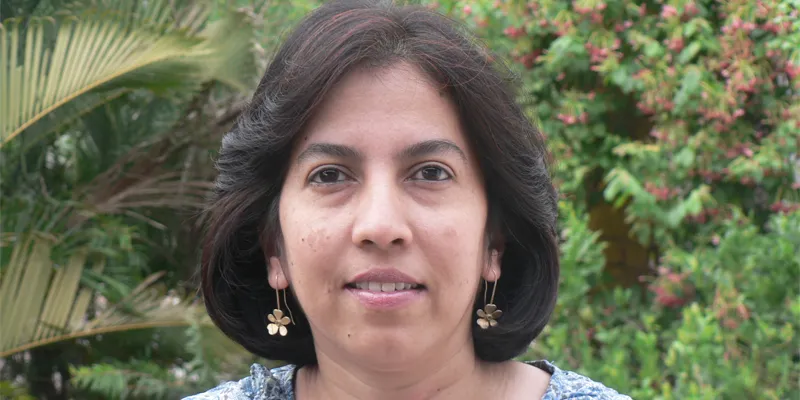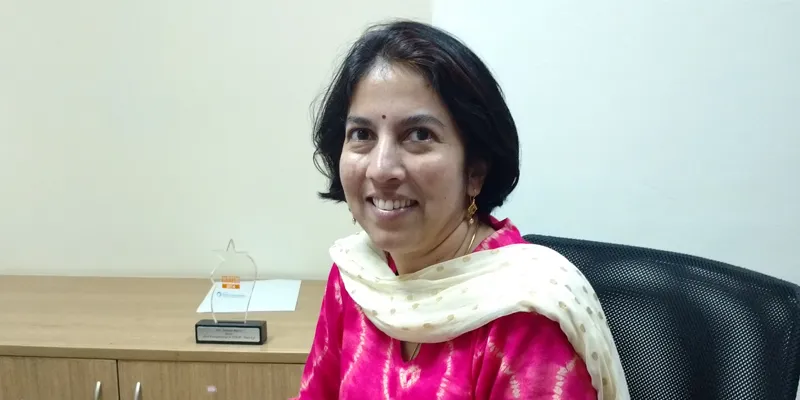Dr Manjiri Bakre claims that her CanAssist-Breast test will benefit about 70pc cancer patients in India
Within two years of the diagnosis, Dr Manjiri Bakre lost her friend, who was only 30, to cancer. Despite her experience as a postdoctoral fellow at Moores Cancer Center, University of California, San Diego, she, like others in her circle, hadn’t grasped just how aggressive her friend’s disease had been. “I wish we knew more so as to organise ourselves. That made me think that perhaps today we do not diagnose the disease enough and we need to dissect the tumour biology more to understand the disease progression or its aggressiveness,” says the 47-year-old.
Driven by the need to make a difference in the life of cancer patients, she founded OncoStem Diagnostics Pvt Ltd in 2011.
Based in Bengaluru, the oncology diagnostics company focuses on developing innovative tests in the personalised medicine space.

Their aim is to develop new diagnostic tests that, by predicting the risk of cancer recurrence, can help patients escape chemotherapy’s toxic side effects, in addition to being relatively easy on the pockets.
Breast cancer is the most common cancer found in women in India, surpassing cervical cancer, which according to Manjiri held that distinction for many years. This is the reason why OncoStem’s focus is on breast cancer.
“About 70 percent of breast cancer patients in India and about 50 percent of breast cancer patients worldwide will benefit from this test,” she emphasises.
Tailor-made therapeutic strategies
While such tests have helped patients in the US and Europe test the impact of cancer, they are prohibitively expensive. Also, according to Manjiri, they are primarily for Stage 1 patients, which becomes problematic in the Indian context, because for less than eight percent of the 1,50,000 women annually diagnosed with breast cancer does the diagnosis come in Stage 1. Over 40–50 percent are detected in Stage 2 and about 50 percent of the patients relapse within five years.
Their first test, CanAssist-Breast, determines the tumour’s molecular fingerprint and assesses its aggressiveness.
According to Manjiri, almost 95 percent of early-stage (stages 1 and 2) breast cancer patients get chemotherapy to avoid cancer recurrence. However, the chemotherapy is known to benefit only about 10–15 percent of patients in the early stages of the disease. Also, its side effects can reduce the ‘quality of life’ (QOL) of the patient substantially.
OncoStem attempts to detect which early-stage cancer patients have high chances of recurrence, in order to plan the ideal chemotherapy treatment. The clinicians use the test results to devise tailor-made therapeutic strategies for each patient.
"Our test helps clinicians decide whether or not to use chemotherapy to treat a patient. All these years, clinicians have been using age, tumour size, grade, node status, ER, Pr and Her2 receptor status to make this decision. Over the years, various studies have demonstrated that while these parameters are useful, they are insufficient to decide choice of treating with CT. We look at the tumour biology in detail by doing our test, and in specific, our biomarkers are the key parameters. Based on the expression of each biomarker, treatment is customised for each patient," says Manjiri.
OncoStem can assist
“Over the past five years, we have studied data about the patterns of breast cancer recurrence in India and worldwide to understand what makes the cancer recur in some women while others respond well to treatment. Our flagship test, CanAssist-Breast is the result of five years of R&D involving multiple research collaborators in India and globally,” says Manjiri.
The effectiveness of the test is measured by an ongoing prospective study which is already underway and should be published in seven years by Manjiri and her team.
The test has to be prescribed by clinicians and patients can avail it by contacting OncoStem or their channel partners.
To ensure that doctors and clinics are aware of CanAssist-Breast and can prescribe it to patients, OncoStem is reaching out to people through presentations and booths at conferences while simultaneously conducting CME seminars in various hospitals and their oncology forums.
Since doctors prescribe it, they are a part of the targeted audience along with insurance companies and central and state insurance policies that offer subsidised healthcare.
OncoStem consists of 15 employees and a small team of statisticians in the US. They have multiple experts — including three onco-pathologists and three PhD scientists — working on the test.
Technology
The test uses a few clinical parameters about tumour and combines it with robust biomarker analysis performed by immunohistochemistry (gold standard proteomics-based technology). Manjiri adds, “This information is then layered onto a statistical algorithm developed by us that stratifies patients as ‘low or high’ risk for cancer recurrence. For high-risk patients, our test will offer targeted drugs in future.”
Finding her feet
At OncoStem, Manjiri wears multiple hats. She started right from setting up the laboratory infrastructure to hiring and training the first few employees. “I also do fund raising, take care of scientific aspects, legal and patenting, plan out new tests and research avenues, marketing the test, finding new partners to work with us within India and abroad.”
Manjiri’s own expertise in the field of microbiology has come in handy. She holds a PhD in Cell Biology from the Indian Institute of Science, Bangalore and one of her two postdoctoral fellowships is from Mt. Sinai School of Medicine, Howard Hughes Medical Institute in NYC.

Though a niche area, the challenges for Manjiri have been many. Dealing with people who either don’t want to help or dissuade others from it was the first thing she had to tackle. “Working with hospitals in India to develop anything which uses clinical material has been a huge challenge due to lack of clear guidelines and implementation of the same.” That would explain why she is so grateful to all the good hospitals, visionary leaders, and clinicians who have shown faith in the test.
Funding
For product-based startups in life sciences such as Manjiri’s, funding is required early on to start the work and the gestation period for the product to see the light of day is long.
Fund raising has been a challenge and mostly because of the way the system works, or does not work, according to Manjiri. However, she believes it can certainly be improved.
Her first round of funding has helped them get where they are today. “When I approached the VCs five years ago, it was only a concept. Thanks to the funding and support shown by Artiman Ventures, five years later we have a product ready and launched in India.”
The second round of funding will help expand the team, sales and marketing, and R&D efforts to launch more tests in the near future.
Road map
The test has been launched in India should be introduced in Bhutan, Nepal, Sri Lanka followed by SE Asia, MENA region, Europe and US markets in a phased manner in the near future.
They are also working on spreading the word about the test and have approached the Karnataka State Health Ministry to make them aware of the test and are in the process to apply for the insurance schemes.
Since it is a very niche market, the growth is going to be slow. However, if the test makes good on its promise of preventing a relapse of breast cancer, then there is no stopping the team at OncoStem.







